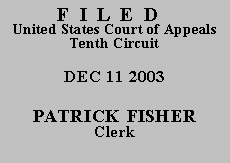

| UNITED STATES OF AMERICA, |
|
| v. | |
| ROBERT CARBAJAL, |
|
ORDER AND JUDGMENT(*)
Robert Carbajal was indicted and arrested for conspiracy to possess with intent to distribute, and to distribute, methamphetamine and cocaine, in violation of 21 U.S.C. §§ 841(a)(1), 841(b)(1)(A), 841(b)(1)(B), and 846. After initially pleading not guilty, Mr. Carbajal entered a plea of guilty at a change of plea hearing. On February 20, 2002, the district court sentenced Mr. Carbajal to 168 months' imprisonment, five years' supervised release, and a fine of $1000.00. He moved to have his sentence vacated based on his counsel's failure to file an appeal. The United States agreed with Mr. Carbajal's position, and the district court granted the motion to vacate. On May 9, 2003, Mr. Carbajal, represented by new counsel,(1) was re-sentenced to 168 months' imprisonment, five years' supervised release, and a fine of $1000.00.
Mr. Carbajal now appeals his sentence. His attorney has filed a brief pursuant to Anders v. California, 386 U.S. 738 (1967), and has moved for leave to withdraw as counsel. The certificate of service indicates that Mr. Carbajal has been served with the brief and motion; no response has been received from him, and the government has declined to file a response brief. We grant leave to withdraw and affirm the conviction.
Anders holds that "if counsel finds his case to be wholly frivolous, after a conscientious examination of it, he should so advise the court and request permission to withdraw." 386 U.S. at 744. Counsel's request to withdraw must "be accompanied by a brief referring to anything in the record that might arguably support the appeal," and a copy of this brief must be served on the client. Id. Upon receiving an Anders brief, this court "proceeds, after a full examination of all the proceedings, to decide whether the case is wholly frivolous." Id.
We note at the outset that by pleading guilty, Mr. Carbajal waived all non-jurisdictional challenges to his conviction and his "only avenue for challenging his conviction is to claim that he did not voluntarily or intelligently enter his plea." United States v. Wright, 43 F.3d 491, 494 (10th Cir. 1994). As indicated in counsel's Anders brief, Mr. Carbajal seeks to raise two issues on appeal: 1) lack of voluntariness of his guilty plea, and 2) ineffective assistance of counsel. We have fully examined the proceedings as required by Anders and conclude that the appeal is wholly without merit.
Nothing in the record suggests that Mr. Carbajal's guilty plea was made under duress or coercion. At the change of plea hearing, the district court explained to Mr. Carbajal the rights he would relinquish by pleading guilty. The court told Mr. Carbajal, "You need to understand that you do have the right to plead not guilty to any offense charged against you and you do have the right to continue with that plea." Rec. vol. III, at 17 (Tr. of Dec. 12, 2001 Change of Plea Proc.). When asked, "You understand these rights?" Mr. Carbajal replied, "Yes, Your Honor." Id. at 18. At the re-sentencing proceeding, the judge directly asked Mr. Carbajal, "Was that plea agreement signed voluntarily of your own free will?" Rec. vol. V, at 5 (Tr. of May 9, 2003 Re-Sentencing Proc.). Mr. Carbajal answered, "Yes, sir."
As to Mr. Carbajal's ineffective assistance claim, we have held that, generally, "[i]neffective assistance of counsel claims should be brought in collateral proceedings, not on direct appeal. Such claims brought on direct appeal are presumptively dismissible, and virtually all will be dismissed." United States v. Galloway, 56 F.3d 1239, 1240 (10th Cir. 1995); see also Massaro v. United States, 123 S.Ct. 1690, 1694 (2003) ("In light of the way our system has developed, in most cases a motion brought under § 2255 is preferable to direct appeal for deciding claims of ineffective-assistance."). We therefore decline to review Mr. Carbajal's ineffective assistance claim in this direct appeal.
After careful review of the proceedings, we agree with counsel that no non-frivolous grounds for appeal appear on this record. Accordingly, we AFFIRM the conviction and GRANT Mr. Carbajal's counsel's request to withdraw.
Entered for the Court,
Robert H. Henry
Circuit Judge
*. This order and judgment is not binding precedent, except under the doctrines of law of the case, res judicata, and collateral estoppel. The court generally disfavors the citation of orders and judgments; nevertheless, an order and judgment may be cited under the terms and conditions of 10th Cir. R. 36.3.
1. Mr. Carbajal was represented by a court-appointed federal public defender throughout the proceedings. Mr. Carbajal's current counsel, Timothy J. Judson, did not enter an appearance in the district court on Mr. Carbajal's behalf until April 24, 2003. Notice of appeal was filed on May 21, 2003.